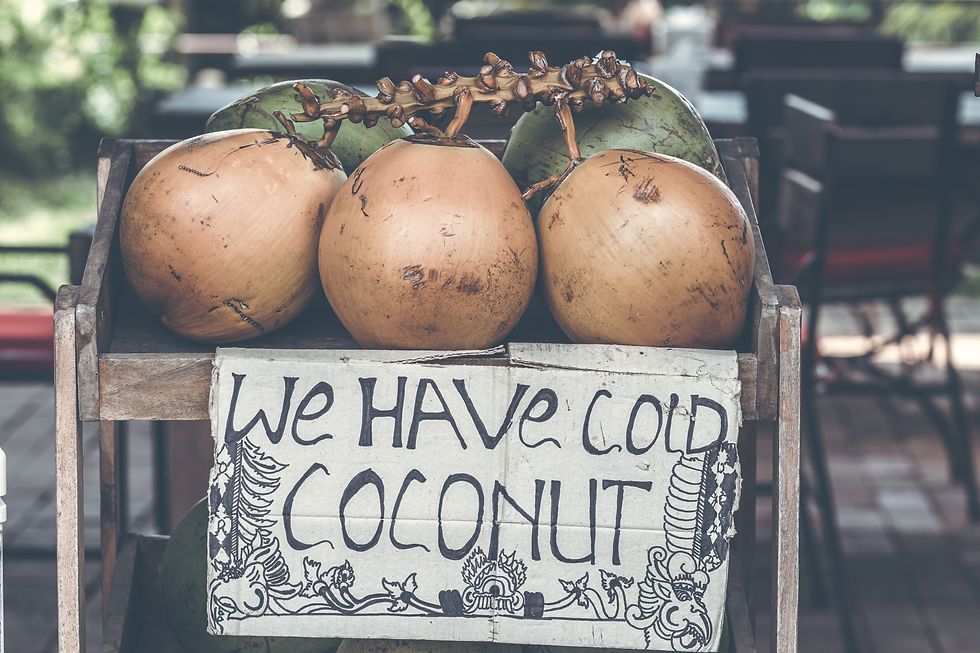Coconut: A fatty sensation
- Jun 25, 2018
- 3 min read

I recall back in the 90s, I would use coconut oil for tempering or making Sambar (South Indian lentil stew). My mother would tell me how everyone; meaning the media, health experts, nutritionists, and doctors were advising about the high cholesterol levels in coconut. I would wonder, if this is true, it must be hard on the South Indians as coconut oil and coconut products form an important part of their diet. Nonetheless, I would still use coconut oil as I loved it ‘s taste. All these coastal recipes: Goan fish curry, Mangalorean fish curry, Gassi, Xacuti chicken curry etc taste better when made in coconut oil. Why is it that coconut was considered unhealthy and all of a sudden, it is now a 'knight in shining armor'?

Freshly grated coconut is an excellent topping to add satiety to your food. It prevents overindulgence in eating, adds healthy fats to your food lowering the glycemic index and contains MCT. MCT stands for medium chain triglycerides. It is a fat similar to one found in mother's milk. It is this chain of fatty acids that help form the myelin sheath around the nerves helping them retain information and send appropriate signals. Myelination forms an insulation around our nerves to protect the nerve impulses and signals. It also helps us in critical thinking and decision making. The process of myelination begins in the womb and is extremely critical for baby's growth and overall development.
Those dealing with thyroid or diabetic issues would benefit from eating coconut as it improves insulin sensitivity, reduces GI of food and prevents overeating. Thyroid functioning is associated with metabolism, monthly cycles, fatigue and extreme emotions like anxiety or depression. Coconut aids proper functioning of thyroid gland improves metabolism, relaxed and balancing emotions.
Fat in coconut oil is converted into ketones. Ketones stored in the liver can be used as an alternate source of energy for brain cells, making coconut an important benefit for Alzheimer's, schizophrenia or dementia patients.
Coconut oil also contains a special acid called lauric acid. The job of lauric acid is to burn fat. It is also an antioxidant and has antibacterial and antiviral properties.
Lauric acid also helps to protect your heart and if you are recovering from a viral, fungal or yeast infection, make it a point to add coconut to your meals.
The soft tender flesh of coconut also fights constipation and is very important for supporting Crohn's symptoms.

Coconut water is an excellent energizer and a perfect afternoon drink. When you feel tired or weak, drink coconut water to revitalize your mind and body. Oh and don't forget to eat the flesh inside- it will add satiety and will save you from undesirable munching. It also makes a perfect post-workout drink. Rich in potassium and magnesium, it hydrates your body and prevents muscle spasm or cramps.
The richness of coconut oil also promotes soft glowing skin, luscious, dandruff free, long, thick hair. Massage the scalp with coconut oil at least twice a week. It also calms your brain and promises a good night sleep. A perfect accompaniment for parathas. Freshly or dry grated coconut can be ground up to make delicious chutneys, used as a garnish or in desserts.
Every part of coconut tree has some purpose. Leaves are used to cover the roofs to prevent sunlight from overheating the house. Husk from the bark is used to make a variety of utility items like brushes, brooms, and baskets. The fruit is what we all are familiar with. Even an empty tender coconut, after drinking out the water, can be used for cooking. Stuff your meat, rice and lentils inside the coconut, seal it and throw it in a campfire- no pots required!
So many benefits of this humble fruit. So don't think a lot. Just grab a coconut and start living a worry-free life.













































Comments